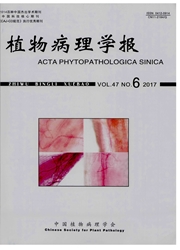

 中文摘要:
中文摘要:
细菌通过IV型分泌系统(Type IV Secretion System, T4SS)的接合系统、效应物转运系统和释放/吸收系统3个子家族进行DNA、蛋白质及毒素的分泌和转运。十字花科黑腐病菌(Xanthomonas campestris pv. campestris, Xcc)是一种重要的植物病原菌,也是研究植物病原细菌与植物相互作用机理的模式细菌之一。本研究通过检测Xcc 8004野生型菌株和T4SS突变体在不同条件下的生长、诱导情况及对过敏反应的影响发现:T4SS不影响在培养基中的生长,与野生型菌株相比,T4SS突变体在非寄主辣椒ECW-10R上的过敏反应减弱;T4SS相关基因受基本培养基MMX诱导表达,且与Ni^2+、H2O2、Phenol等抗逆相关。推测T4SS相关基因在该病原菌的接触、识别阶段起作用。
 英文摘要:
英文摘要:
Bacteria deliver DNA substrates, proteins and toxin to bacterial or eukaryotic target cells or the extracellular milieu generally by conjugation system, effector translocator and release/uptake systems of type IV secretion system (T4SS). Xanthomonas campestris pv. campestris (Xcc) is one of the most important model phytopathogen for study of plant-microbe interactions. In this study, the wild type and the T4SS mutant strains in different conditions were compared, and it presented that T4SS-deletion mutant of Xcc did not affect the growth in NYG and minimal medium MMX but had a weaker hypersensitive reaction (HR) on non-host pepper ECW-10R; the expression of T4SS genes was induced in MMX, and T4SS of Xcc was related to stress resistance to Ni^2+, H2O2 and phenol. Taken together, it is speculated that T4SS is involved in the contact and recognition process during infection of this phytopathogen.
 同期刊论文项目
同期刊论文项目
 同项目期刊论文
同项目期刊论文
 期刊信息
期刊信息
